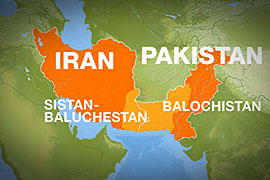Iran blames Pakistan for attack
Ahmadinejad says Pakistani agents had role in Sunday’s attack in Sistan-Baluchestan.

Jafari said Tehran would send a delegaton to Islamabad to deliver “proof to them so they know that the Islamic Republic is aware of Pakistan’s support”.
He also expressed his belief that US and British intelligence services were involved and that there would “have to be retaliatory measures to punish them”.
And state television said Iran’s foreign ministry summoned a senior Pakistani diplomat in Tehran and informed him that “the perpetrators of this attack came to Iran from Pakistan”.
But a Pakistani foreign ministry spokesman rejected the claim. “Pakistan is not involved in terrorist activities … we are striving to eradicate this menace,” he said.
Jundollah blamed
Ahmadinejad’s accusation came after Iranian state media blamed Sunni group Jundollah for the attack in the city of Pisheen.
But other Iranian officials and academics point the finger of blame at the United States and the United Kingdom.
Mohammad Marandi, an assistant professor at the University of Tehran, told Al Jazeera the attack could further damage Iran’s relations with the US.
| In depth | |||||||||
|
“On the one hand, the Americans are talking about rapprochement and building a new future, yet at the same time we see the Americans supporting groups in [Iran’s] Kurdish regions as well as in Sistan-Baluchestan,” he said.
Washington has denied involvement with the group, which it has labelled as a “terrorist” organisation, and condemned the attack.
“We condemn this act of terrorism and mourn the loss of innocent lives,” Ian Kelly, the US state department spokesman, said in a statement soon after the blast occurred.
“Reports of alleged US involvement are completely false,” he said.
Tehran has also suggested that Saudi Arabia and Britain may have supported Jundollah to stir up trouble in the border area.
Majid Tafreshi, an Iranian researcher at University College London who specialises in ethnic and religious minorities, said there were clues as to the involvement of Western nations.
“Generally you cannot find any proof about this claim, but there are some clues,” he told Al Jazeera. “The previous American governments used to play with ethnic minority and ethnic religious groups to play with Iranian politics.”
On wanted list
Tafreshi said “you can see in British media nowadays that people who are representative of this terrorist group are easily working and talking to British media and involved in politics and lobbying parliament … while this group is on the terrorist list and its leaders on the wanted list of Interpol.”
Al Jazeera’s Nazanine Moshiri, reporting from Tehran, said: “There’s a history in Iran of pointing the finger at foreign outside intervention for causing instability.
 |
“There was a report in the New Yorker about a year ago by the journalist Seymour Hersh who said the United States Congress had secretly agreed to President [George] Bush’s funding of about $400m to give Washington a free hand in arming and funding militant groups like Jundollah.
“Obviously those claims haven’t been backed up by any evidence but the Iranians do believe the Americans have been helping Jundollah in their fight in the southeast.”
But some analysts have rejected the idea that the West supports Jundollah and other ethnic groups.
Ali Nouri Zada, the director of the Arab-Iranian Studies Centre in London, told Al Jazeera: “It’s very easy to point at Saudi, to the British and Americans … [but] it [Jundollah] is a local organisation,”
Zada noted that relations between Iran and Pakistan have been generally good in recent years and the neighbours are co-operating on plans to build a natural gas pipeline link.
